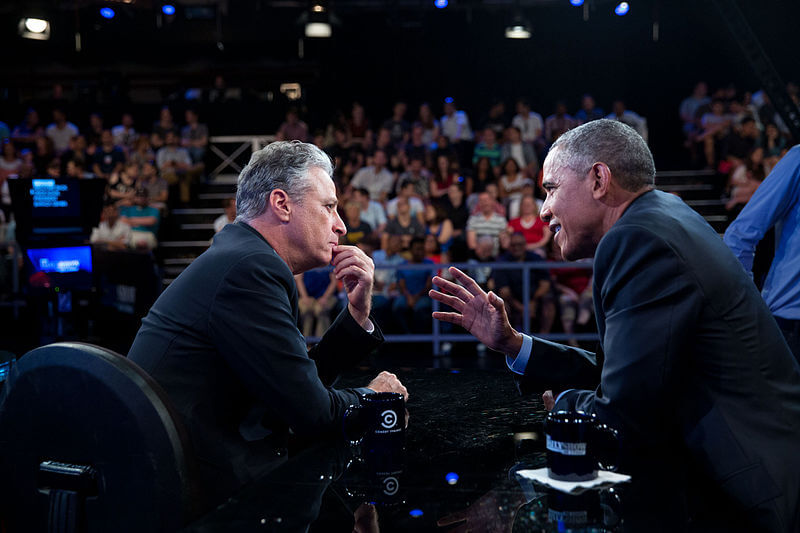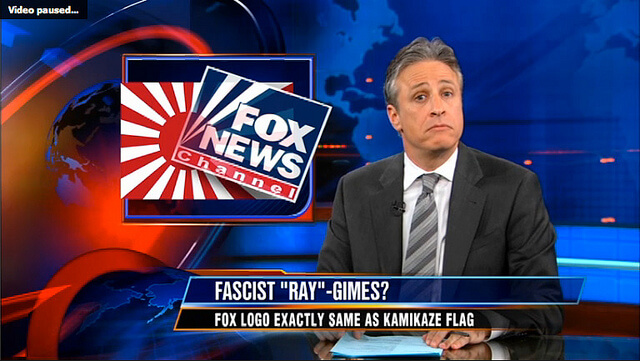As notable comedian Jon Stewart wraps up his final episode of The Daily Show, Mostafa Rachwani reflects on the huge role that the liberal, Jewish American comedian played in shaping a Muslim, Arab Australian’s thoughts on media representations.

US President Barack Obama appeared seven times on The Daily Show with Jon Stewart. By: Pete Souza
“The only person I’d lose my mind to meet is Jon Stewart.”
My university study buddy and I would make this running joke every time the Australian public collectively lost their minds over a desperate desire to meet visiting celebrities or monarchs.
It speaks to the enduring legacy that Stewart will leave behind as he ends his show Thursday night, US time. There was no one else in the world that my friend and I, relatively media-savvy, left-leaning Arab Australians that we were, would want to meet.
In fact, I’d go so far as to say, watching Stewart as a teenager inspired me to take on a communications degree and seek out a career in journalism – and I’m sure I’m not the only one. Stewart’s enduring popularity has built steadily since his debut on The Daily Show in 1999, peaking at more than 1.6 million viewers in 2008-9. But how did a comedian whose form of entertainment involved reading the news with exasperated sighs, flailing arms and bulging eyes come to have such an enormous reach?
It’s possible that, for a generation of young people brought up in a toxic media environment, Stewart’s rational (and often utterly hilarious) voice was far more than just a breath of fresh air. It was a stinging rebuke of the rising bipartisan norm of a mainstream media that had become increasingly tolerant of racism, Islamophobia, sexism, xenophobia, and more. In a political climate that was increasingly right wing, Stewart’s politics took on a voice of its own, giving personality and versatility to the left, providing character to alternative discourse, and proving that people don’t always simply believe what is presented to them.
For someone living the minority experience in Australia and feeling the typical isolation and disempowerment that comes with a lack of mainstream media representation, Stewart seemed like a revolutionary to me. I was accustomed to feeling cynical and angry whilst consuming news media, and I consumed quite a bit of it by reading the paper almost every day since I was 14 years old – a habit that turned me into a typical, angry young man.
In retrospect, I believe that it all came to feeling largely unrepresented in public debates on issues that I cared about deeply. There was a deep frustration with knowing that no one would hear my rants – no one knew of my growing cynicism or heard the steam coming out of my ears. Here I was, tucked away in a small-time university somewhere in Western Sydney, screaming in frustration at a computer screen, completely alienated from the discussions I so deeply wanted to enter.
That isolation really kicked in when I noted how blase people were about so many injustices happening around the world. ‘Surely they care, somewhat?’ I’d rant to my study buddy. ‘Surely they can’t be that ignorant.’ But I was wrong, and most of the people I met couldn’t give a hoot about what was happening around the world, making my anger seem irrelevant and melodramatic – it was something I should hide, something that wasn’t okay.

Stewart’s special brand of humour turned mainstream media on its head. By: Peter Petrus.
Jon Stewart, however, proved me wrong. He had a knack for expressing exactly what I was thinking – obviously in a more articulate manner than my 19-year old self, but largely the same. His rants made mine feel less pointless. Stewart’s ability to tear apart arguments gave me purpose, and his passionate zeal only outdid my own.
Finding Stewart allowed me, for once, to feel represented in these discussions, as though my own personal, imagined squabbles with voices that I so vehemently disagreed were not as pointless as I initially thought. After all, they were shared by a famous comedian on TV! It empowered me to realise that there was a justification for my anger, and that it can be channeled somewhere constructively.
His evisceration of hard-right voices became legendary. Freed from the throttling social shackles that usually characterised mainstream news shows, Stewart and his team at The Daily Show were able to powerfully slice through outrageous statements , backed up by carefully stitched together compilations of video evidence.
When Stewart turned his flamethrower on anyone, you knew in your heart that you were in for something special. Nowhere is that better characterised than his epic destruction of Glen Beck in 2011. Beck’s usually incoherent and utterly paranoid daily rants on Fox News were utterly blown apart by Stewart, who amusingly articulated the many ways in which those rants went wrong.
Stewart’s deep mistrust for a system that, ironically, benefits people like him was the kind of nuance that had so often been missing from public discourse. It demonstrated that one could be more complicated than a simple caricature drawn based on their background – that one could be aware with their own privilege.
It also provided me with the impetus to feel comfortable criticising the mainstream, sometimes in the face of great resistance, without feeling left out of the general discussion.
That isn’t to say that everything Jon Stewart touched turned to gold. There was never a denial of his privileged, liberal, Jewish upbringing, but it was distinct in the way it shaped his approach to the news. There were times when he showed a nuanced understanding of racism and Islamophobia, and other times where he appeared too faint-hearted to internalise anything remotely radical.
Nonetheless, it is a humbling and emancipating experience to understand that our heroes aren’t perfect and still concede to their context. It allows a better understanding of who they are as people instead of what ideals they are supposed to represent.
It also allows us to engage in what we can learn from our heroes without delving into blind worship. Jon Stewart isn’t perfect, but he taught me to direct my bubbling rage into something constructive, to remain optimistic in the face of misinformation and hatred, and to always look for the silly pun in any serious situation.
Most of all though, Stewart taught me that it’s okay to be angry.
In true Jon Stewart style, The Daily Show presenter ended his final episode with humorous commentary about how “bullshit” comes about and why it is “everywhere”. Watch his sign off here .
